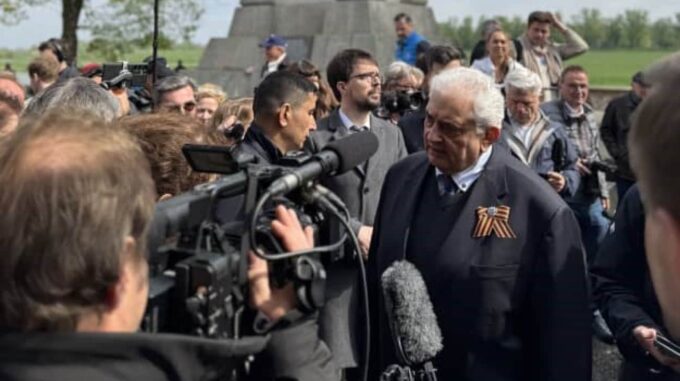The Russian ambassador to Germany has once again found himself at the center of a scandal by appearing uninvited at a commemorative event dedicated to the Second World War, sparking a wave of dissatisfaction and outrage among those present

The incident took place in the city of Torgau, where on April 25th, the 80th anniversary of the historic handshake on the Elbe River between American and Soviet soldiers was celebrated — a symbol of the farewell meeting marking the end of the war in Europe. Ambassador Sergei Nechayev of Russia appeared at the ceremony without any invitation, catching the organizers and guests off guard. Accompanied by journalists and local residents, the diplomat spoke about the importance of remembering fallen soldiers: "We must remember those who defended our freedom. This day holds special significance for us." However, his appearance was not received unambiguously — among those present, there were not only outraged shouts but also booing. Prior to this, Ukraine’s ambassador to Germany, Oleksii Makeyev, urged not to allow the Russian diplomat into the event and emphasized the inappropriateness of his presence, especially considering the current political situation. When asked about the reaction of the German public, who did not welcome him, Nechayev remarked that "I do not perceive that; I feel comfortable here." In addition, he had a brief conversation with several attendees, and his lapel was adorned with a black-and-orange ribbon — a symbol that, according to Russian propaganda, supposedly signifies the Second World War. The reactions of political leaders in Germany were also swift. The Prime Minister of the federal state of Saxony, Michael Kretschmer, openly addressed Nechayev with a pointed concern regarding Russia’s ongoing military actions against Ukraine. "Russia itself initiated the war against our country as early as 2014, not in 2022. It has to go to negotiations and put an end to this war — and only it," said the politician, hinting at the obvious violation of international law. Kretschmer also acknowledged the civilian losses, recognizing the enormous number of casualties of the Soviet army, but emphasized that the victory in Europe was achieved through a multinational joint effort: "Not only Russians participated in the fighting but also Ukrainians, Belarusians, and Georgians. It would be more appropriate and valuable to see representatives of these nations among the participants." Meanwhile, the situation surrounding the Russian ambassador in Germany continues to develop. Last week, Nechayev, without an invitation, appeared at the Zeelov Heights memorial, which sparked criticism and concern. Threats of police intervention by the memorial’s administration — should the diplomat attempt to return — were also voiced. The war in the Eastern European country and its consequences remain a sensitive topic in Germany. On one hand, there is a commemoration of the past; on the other, political conflicts and diplomatic difficulties revolve around manifestations of Russian presence at events of historical significance. All these events demonstrate how confrontation continues to be at the forefront of German politics and society, and how difficult it can sometimes be to establish dialogue amid political tension and historical grievances.

